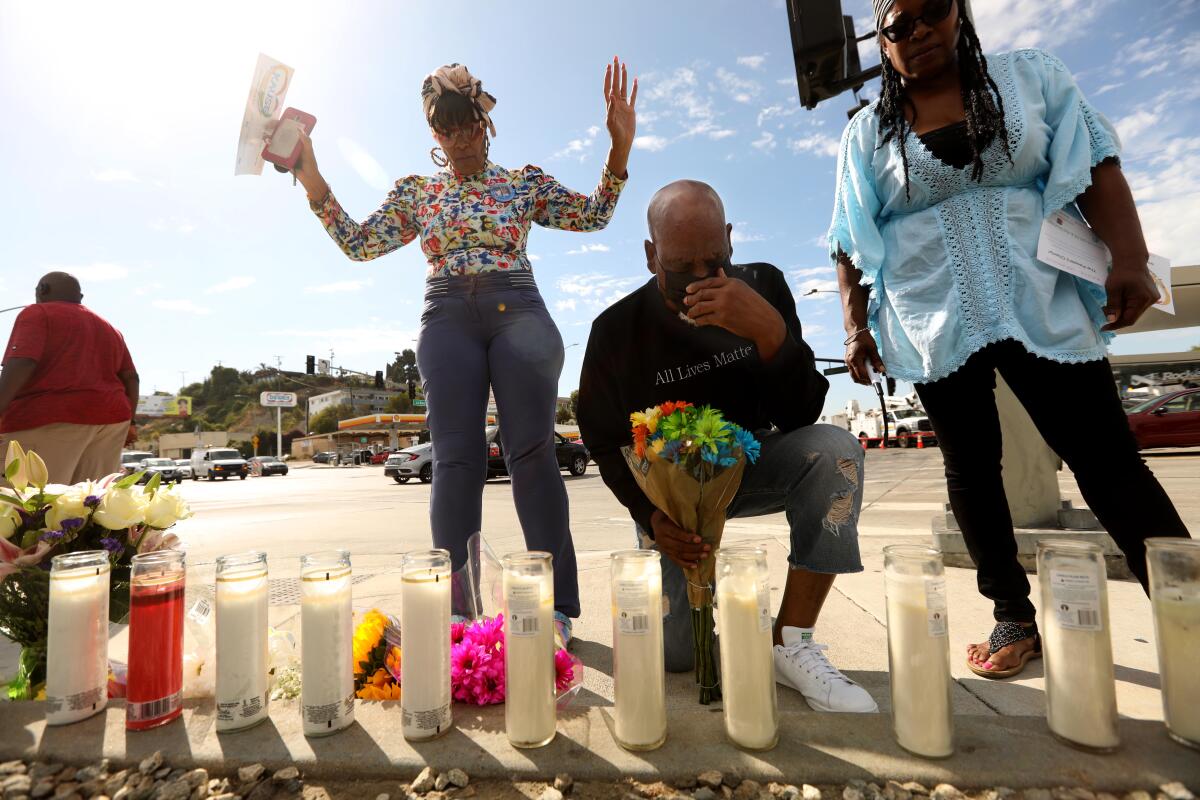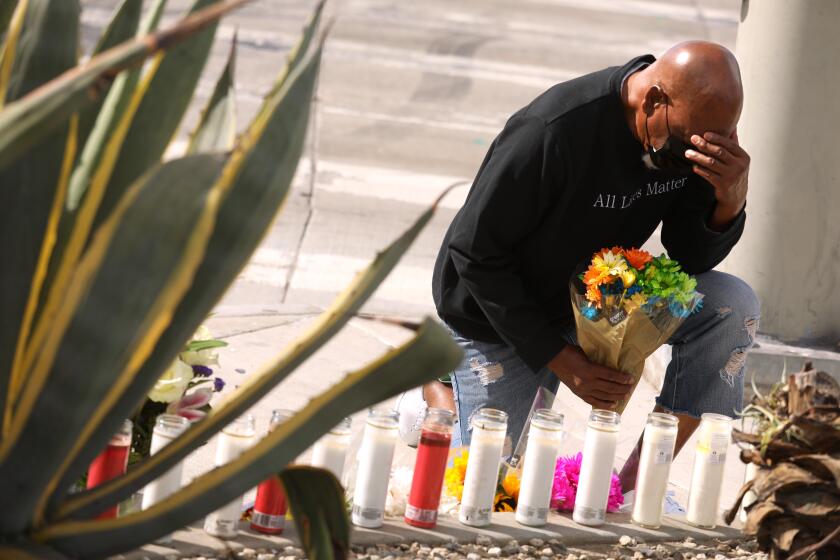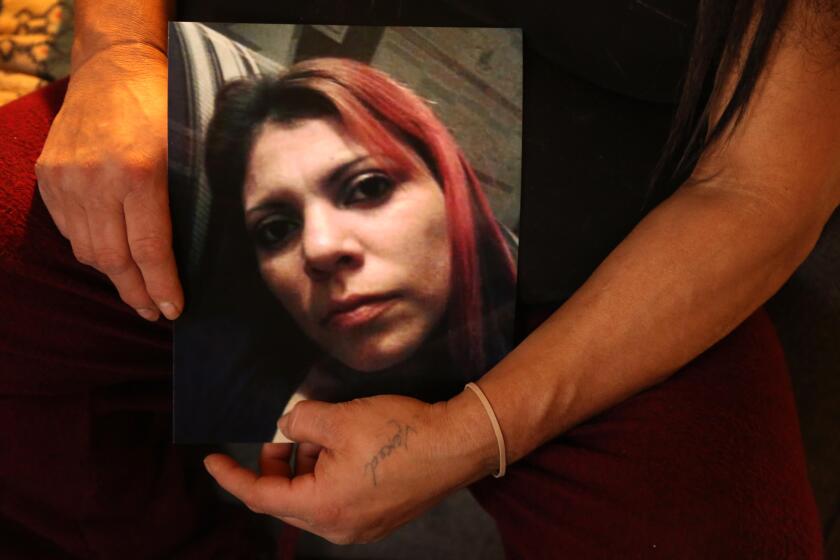Windsor Hills crash’s uncounted victim: Armani died before he took his first breath

- Share via
Guttered votives, wilted sunflowers and a menagerie of pristine plush creatures marked the blackened corner where Armani Lester’s life ended before he took his first breath.
Six bodies were found by the coroner at the Aug. 4 crash site in Windsor Hills. Six murder charges were filed against the driver of the Mercedes-Benz that barreled through the intersection of La Brea and Slauson avenues. The fiery collision was so violent, L.A. County Coroner spokeswoman Sarah Ardalani said, that it tore Armani from his mother’s womb.
Yet California law remains split over how to count the crash victims and what defines justice for pregnant women whose babies die before birth.
“Under state law, the unlawful killing of a fetus can be charged as a murder,” a spokesperson for the L.A. district attorney explained. “There is no similar provision for vehicular manslaughter.”
That’s why the driver, Nicole Lorraine Linton, 37, was charged with five counts of that crime. The registered nurse, who had been working at Kaiser Permanente’s West Los Angeles Medical Center, was speeding at more than 90 miles per hour when she careened through a red light at Slauson and slammed into multiple cars.
The crash killed pregnant 23-year-old Asherey Ryan and the boy posthumously named Armani, who was barely a month from his due date. It also claimed Ryan’s 11-month-old son, Alonzo Quintero; her boyfriend, Reynold Lester; and best friends Nathesia Lewis, 43, and Lynette Noble, 38.
Family members of a pregnant women left reeling after she and four others killed in horrific crash
Linton is being held without bail at the Century Regional Detention Center.
But where did the distinction between charges — six murder, five manslaughter — come from? And why would California, a self-proclaimed “reproductive freedom state,” want to enshrine fetal murder in its homicide statute?
The answer goes back to a 1970 law, written two and a half years before Roe vs. Wade was decided and decades ahead of the push for “fetal personhood” by antiabortion legislators. It was conceived as a proxy to protect pregnant women, who even today are twice as likely to die by violence than from hemorrhage or preeclampsia.
“This was never about a backdoor to fetal personhood,” said Michele Goodwin, a law professor at UC Irvine and an expert on reproductive justice. “These were feminists trying to protect women who were being battered.”
In 1969, an Amador County man hunted down and brutalized his pregnant ex-wife, kicking her belly so hard he left heel prints. The baby was stillborn just hours after the attack, her skull severely fractured. The man was charged with murder, but the California Supreme Court vacated the charge, ruling that common law defined a “human being” as one who’d been born alive.
So California legislators rewrote the law. Three dozen other state legislatures followed suit.
In 2004, a California jury convicted Scott Peterson of fetal murder in the second degree, helping to earn him the death penalty. That same year, the California Supreme Court ruled that fetal murder could be charged even in cases where the accused did not know the victim was pregnant, such as in crashes like the one in Windsor Hills.
Yet 50 years of “fetal protection” laws have done little to curb maternal homicide, which remains the leading cause of death for pregnant women in the U.S. Instead, such laws are increasingly used to prosecute women who suffer stillbirths.
“These laws were passed in the name of protecting pregnant people from harm — from abusers, hit-and-runs, bank robbers — but the laws ended up being used against pregnant people themselves,” said Farah Diaz-Tello, legal director of If/When/How, a reproductive rights nonprofit based in Oakland.
A recent study by the National Advocates for Pregnant Women documented more than 1,700 cases nationwide between 1973 and 2020 in which women were criminalized for their conduct during pregnancy or its outcome.
“What we saw in the ’80s and ’90s was a perfect storm of the antiabortion movement and just plain racism and cruelty,” Goodwin said. “Prosecutors were amped up on the war on drugs, amped up on ‘welfare queen’ mythology — they got this idea that if women had stillbirths, they must have caused it themselves. It must have been a cigarette they smoked; it must have been a Valium they took. We see this effort to make something look like science that isn’t.”
Indeed, arrests and prosecutions for pregnancy loss have grown more common in recent years.
“The abortion debate has presented this abstract idea that every pregnancy ends with a healthy baby. It doesn’t,” said Jill Wieber Lens, a law professor at the University of Arkansas and an expert on legal recognition and treatment of stillbirth. “Twenty-four thousand stillbirths still happen each year in this country.”
Yet even in hard-line antiabortion states, fetal murder prosecutions are relatively rare.
“I can’t name one murder prosecution for a stillbirth in Arkansas, but I can name two in California,” the professor said.
Both those cases were brought in the last five years, by the same Central Valley prosecutor.
In 2018, Kings County Dist. Atty. Keith Fagundes charged then-29-year-old Adora Perez with murder after she suffered a stillbirth at 37 weeks of pregnancy. He alleged that she’d used methamphetamine, which led to fetal demise.
Prosecutors in Central California have dropped a murder charge against a woman in connection with the death of her unborn child through drug use.
Those allegations were never proved and would not meet the legal standard for murder if they had been, experts said. The Kings County district attorney’s office did not return calls for comment.
At the urging of her lawyer, Perez pleaded no contest to manslaughter, a crime that does not exist for fetuses.
“The antiabortion movement has invested in trying to reach district attorneys to advise them to prosecute in these spaces,” Goodwin said. “In the state of California, we should always be mindful: It’s not just simply what happens at the Legislature that impacts pregnant people’s lives; it’s also what happens in the offices of the prosecutors.”
In 2019, Fagundes charged 26-year-old Chelsea Becker, a mother of three, with the same crime after a stillbirth.
Becker’s case sparked national outrage and renewed scrutiny of the law.
“The Legislature’s purpose in adding the killing of a fetus to Penal Code section 187 was not to punish women who do not — or cannot, because of addiction or resources — follow best practices for prenatal health,” California Atty. Gen. Rob Bonta wrote in a June 2021 amicus brief on Perez’s behalf. “A contrary interpretation would lead to absurd — and constitutionally questionable — results.”
In January, Bonta sent a legal alert warning California prosecutors and law enforcement officials that “the state is forbidden from punishing people for the outcome of their pregnancies.”
“The charges against Ms. Becker and Ms. Perez were not consistent with the law, and this misuse of section 187 should not be repeated,” Bonta said. “With reproductive rights under attack in this country, it is important that we make it clear: Here in California, we do not criminalize the loss of pregnancy.”
In the months that followed, Perez’s conviction was vacated, and charges against both women were dropped. Fagundes lost his seat in an early-June upset.
But Becker spent more than a year in pretrial detention, and Perez languished in prison for four. For many, the fall of Roe vs. Wade, which protected a woman’s constitutional right to abortion, makes the threat of such prosecutions more real and the need to prevent them more urgent.
So California legislators are once again rewriting the law.
Assembly Bill 2223, which is expected to pass this month, would revise section 187 of the penal code to further shield pregnant people from prosecution. It would also limit death investigations in many cases of fetal loss.
“This bill really just enshrines what’s already state law,” said Assemblymember Buffy Wicks (D–Oakland), the bill’s sponsor. “It ensures that pregnant people cannot be prosecuted for pregnancy loss, whether that’s abortion, miscarriage, stillbirth or perinatal death due to something that happened in utero.”
The bill would allow people who were wrongfully prosecuted under the statute to sue.
“It provides an avenue of recourse, which is critical,” Wicks said.
The measure would not affect cases like the Windsor Hills crash, where violence inflicted on a pregnant person results in fetal demise. Nor would it legalize infanticide, as critics have charged.
Still, some reproductive rights experts say the once-groundbreaking California law may have outlived its use.
“These laws were passed in the name of protecting pregnant people, but we don’t have data that they’ve been effective,” Diaz-Tello said. “The ramifications ... have been extremely harmful, but there hasn’t been a critical look at whether they’ve accomplished their original goal.”
More to Read
Sign up for Essential California
The most important California stories and recommendations in your inbox every morning.
You may occasionally receive promotional content from the Los Angeles Times.













